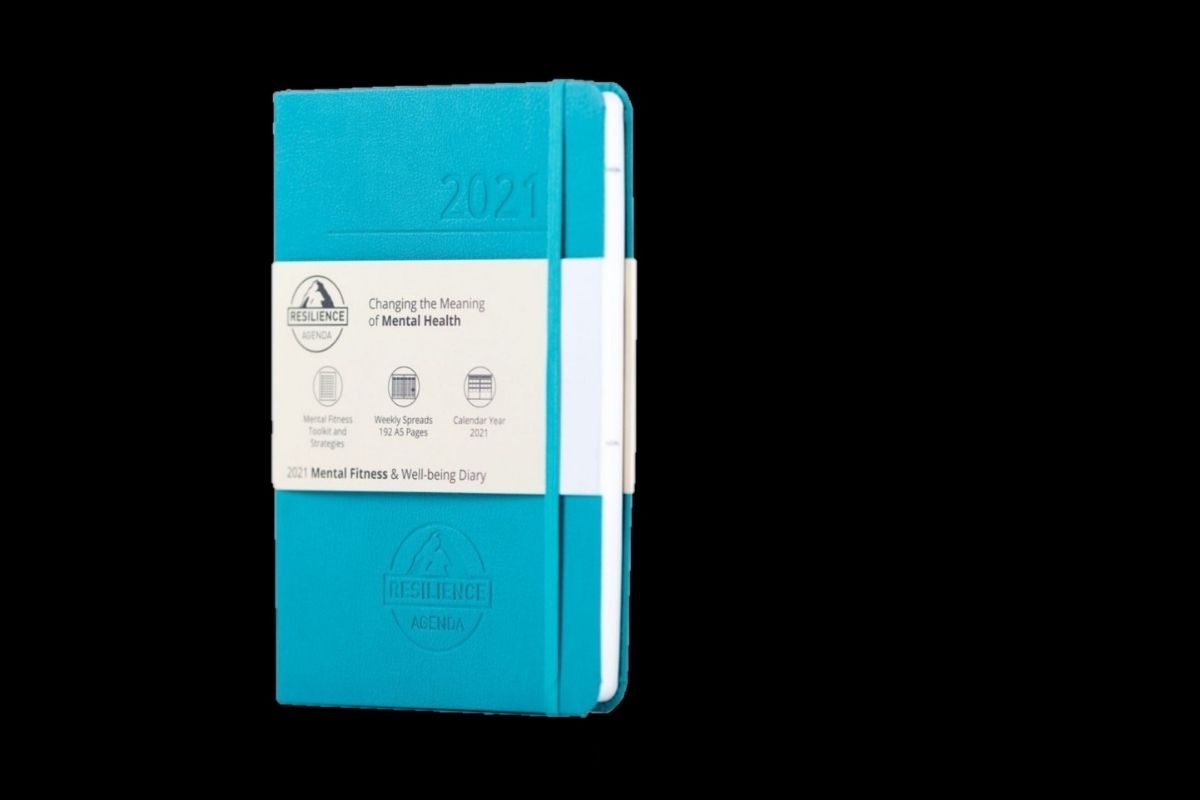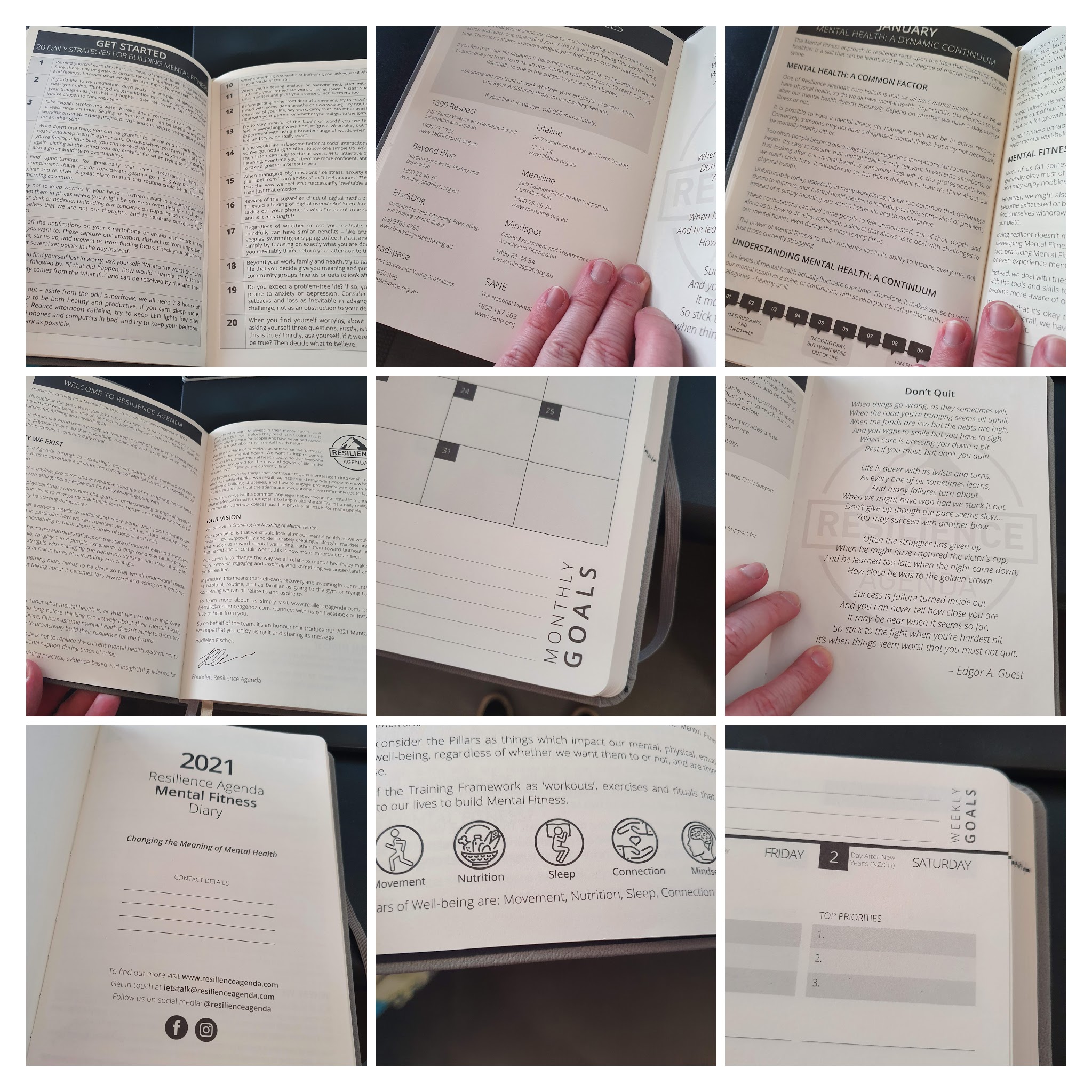
Readers might be aware that I have an interest in the topic of mental fitness. I talk about it on the blog and when I’m speaking. Basically, wherever or whenever someone will listen 😄
That awareness of my interest in the topic reached LinkedIn and Hadleigh Fischer from the Resilience Agenda kindly sent me their 2021 Mental Fitness Diary to peruse.
Right off the bat, I think they’ve done a really nice job of weaving the discussion of mental health and mental fitness into an everyday item. In short, if you are still in the market for a 2021 diary, and are interested in investing in your mental health this year, this could be a wise purchase.
Digging in a little…
I should be upfront and acknowledge that I have not used a paper diary for a long time. Thus I am not up-to-date with what is considered state of the art diary design. That said, this diary appears to have all the standard features in place.
- Yearly planner pages
- Travel and holiday planner pages
- Holidays and observances
- Birthdays and events notes pages
- Priorities and monthly goals
- Week to a 2 page layout – weekly goals and priorities
- Inspirational quotes
- Some note pages in the back
- Ribbon page markers
- Nice feeling vegan leather cover (multiple colours available)
Those aren’t really the stars of the show though. What sets this diary apart from its competition is how mental fitness concepts and activities are weaved into the standard pages.
The diary opens with the team at Resilience Agenda (RA) explaining their mission, namely that people are inspired to think of mental fitness like they do their physical fitness and to know the tools and strategies that lead to resilience and wellbeing. This team wants people to think proactively (rather than reactively) about their mental health and to embrace and talk about their efforts to build a more psychologically rewarding life. They want people building habits and routines into their everyday lives that enable them to extract the most out of life, but also prepare them for the inevitable tough times.
This is definitely a book about preparing oneself mentally to take on the world.
One of the challenges for anyone in this space is wrangling all the potentially valuable habits and actions into some kind of coherent model/framework. The Greater Good in Action people sort their 70+ activities on the basis of the positive emotions sought. The Be Well crew sort their 30+ activities on the basis of what the person is trying to build. RA use the language of wellbeing pillars (movement, nutrition, sleep, connection and mindset) and elements (optimism, mindfulness, gratitude, reframing and perspective), more like an ‘ingredients of wellbeing’ approach. Each month of the year has an article that covers one or more of these areas.
January – the mental health continuum
February – happiness as pleasure, passion and purpose
March – Mental Fitness building blocks – sleep, movement, nutrition
April – growth and stress mindsets
May – reframing and perspective
June – the importance of connection
July – everyday mindfulness
August – focused breathing and meditation
September – gratitude
October – optimism
November – digital nutrition
December – the mental fitness conversation

RA don’t just focus on ‘what to do’ but also ‘how to do it’. They discuss habit and routine formation and encourage readers to utilise the built-in goal setting, prioritising, task lists and standard diary features to add new routines and rituals to their everyday life. This diary is both your place to plan your wellbeing efforts, but also the tool for reminding you to follow-through.
One of the benefits of the mental fitness language is the ability to draw on the physical fitness metaphor: workouts, rituals, routines, investment, training, scheduling, repetition, practice, being proactive, prevention of illness. It is one of the reasons I like the language of mental fitness, because the processes of how we build mental strength are similar to how we build physical strength.
One particularly nice use of this metaphor was the idea that one could pick mental fitness workouts, depending on what one is trying to build.
If one is feeling:
Lethargic → choose movement
Sluggish → choose nutrition
Exhausted → chose sleep
Lonely → chose connection
Uninspired → choose mindset
Helpless → choose optimism
Overwhelmed/scattered → choose mindfulness
Inadequate → choose gratitude
Confronted by a setback → reframing
Isolated → perspective
This is akin to picking yoga for flexibility or swimming for cardiac health. In fact, I think they could have probably expanded this concept and used the diary as a place to both record how one is feeling (mood tracking), but then also be guided to select evidence-based strategies to address/honour those feelings. This would help connect a person’s experience to their choice of activity.
Another nice touch was the “20 Daily Strategies for Building Mental Fitness” found early in the book. This included what I thought were a nice selection of actionable, but grounded strategies like hobbies & purpose, labelling emotions, reminding oneself of the circle of control, turning off notifications etc. Rather than stuck at the front of the book, these could also have been interspersed throughout the weeks (maybe replacing the inspirational quotes).
Overall, I thought the content was well-written and explained. I thought they got the balance right between writing too much (and it becoming a self-help workbook) or too little (and it feeling like a gimmicky diary). However I am mindful that my familiarity with this content makes it easier for me to connect to. I’d be really interested to hear how accessible those without an interest in the area find the content and whether they think it was interwoven well into the diary format.
I suspect RA purposefully shied away from any kind of detailed discussion of mental illness or mental ill-health, although they reference the term at times. I can understand this decision, but I look forward to a time when we are able to discuss mental illness at the same time as we discuss mental fitness and wellbeing. Mental ill-health is an important part of the spectrum of mental health experience and worthy of being discussed in parallel.
Final thoughts
Educating people around strategies for wellbeing is an ongoing task for mental health professionals. Items like this diary bring that discussion into everyday life and I commend the Resilience Agenda team for an elegant effort. I look forward to seeing how they develop the idea in subsequent years, as the knowledge-base in this area expands.

